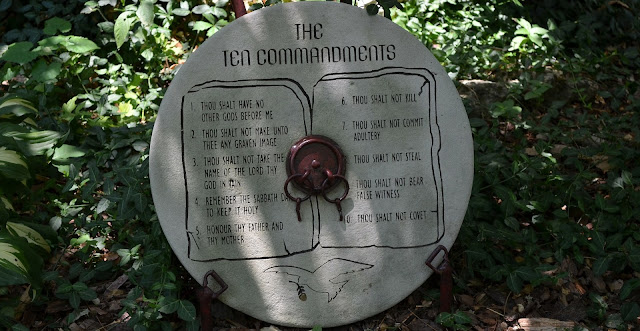“Blessed are those who are persecuted because of righteousness, for theirs is the kingdom of heaven” (Matt 5:10).
It can be rough standing out from the crowd. Don’t expect to be popular if you follow Jesus’ teachings.
As we finish up the Christian Behavior series, we need to look at how the world will react to people who actually follow Jesus. It’s not uncommon to hear that people only dislike Christians when they get preachy about sexual morality. That’s not actually true, though. People speak highly of Jesus' ethical teachings until someone actually starts following them. Then they can get grumpy real quick.
“Therefore everyone who hears these words of mine and puts them into practice is like a wise man who built his house on the rock. The rain came down, the streams rose, and the winds blew and beat against that house; yet it did not fall, because it had its foundation on the rock” (Matt 7:24-25).
We really don’t like rules. The day our first parents broke the one rule they were given something crept into our DNA that makes us chafe against any limitations. Nothing makes us want to touch something more than a sign that says “don’t touch.”
We’ve spent the last several months looking at a lot of rules, things Jesus said to do or not do. Human nature is to go along with the ones that suit us and ignore the ones that seem too hard or too limiting. Jesus warns us not to do that.
“Keep watch, because you do not know on what day your Lord will come” (Matt 24:42).
The King is coming! One day the sky will split open and the Lord will appear. We “do not know the day or the hour” (Matt 25:13), but he’s coming, and it will be good for the servant whose Master finds him doing his job when he returns (Matt 24:46).
It’s tempting to wonder if he’s really coming. It’s been such a long time. This was a problem in the first century, so it’s not surprising for it to appear now.
Above all, you must understand that in the last days scoffers will come, scoffing and following their own evil desires. They will say, “Where is this ‘coming’ he promised? Ever since our ancestors died, everything goes on as it has since the beginning of creation.” ...
But do not forget this one thing, dear friends: With the Lord a day is like a thousand years, and a thousand years are like a day. The Lord is not slow in keeping his promise, as some understand slowness. Instead he is patient with you, not wanting anyone to perish, but everyone to come to repentance.
But the day of the Lord will come like a thief. ... (2Pet 3:3-10)
“Watch out for false prophets. They come to you in sheep’s clothing, but inwardly they are ferocious wolves” (Matt 7:15).
The enemy is among us. The Bible has a lot to say about false teachers. It’s a major topic in 2 Peter, Jude, Galatians, and the Pastorals, but it comes up in almost every New Testament book. Jesus called them “wolves in sheep’s clothing;” Paul called them “savage wolves” who would try to draw away disciples (Acts 20:29-30). Jude called them “shepherds who feed only themselves” (v12).
This isn’t just advice or a warning, it’s a command. Jesus tells us to be vigilant because these people are destructive. They tell people what they want to hear (2Tim 4:3-4). They may create legalistic rules (1Tim 4:1-5) leading to self-righteousness, or they may tell people there are no rules, that they can live however they want (Jude 1:4). Perhaps they’ll get us distracted by godless myths or foolish arguments (2Tim 2:23). Whatever they’re doing, they’re not building up the church. They’re misleading believers for their own profit (2Pet 2:3).
“Ask and it will be given to you; seek and you will find; knock and the door will be opened to you” (Matt 7:7).
Do you trust God? How can we say we trust him to save us from our sins if we don’t trust everything else he says? But when he says, “Ask and it will be given to you,” that’s so hard to believe.
Is it hard to believe he’s able to give us what we ask for? Surely not. If he can create a universe, surely he can meet our little needs. So do we doubt his willingness? I think so. We have to trust that our heavenly Father wants to give us good things.
Paul said, “He who did not spare his own Son, but gave him up for us all—how will he not also, along with him, graciously give us all things?” (Rom 8:32), so we should be willing to act on what Jesus said. How do we do that?
“Do not judge, or you too will be judged. For in the same way you judge others, you will be judged, and with the measure you use, it will be measured to you” (Matt 7:1-2).
Meet this era’s favorite Bible verse. Of course, they misunderstand and misuse it.
“Do not judge” is the only command in the Bible they believe to be absolute. Do not judge, no ifs ands or buts. Jesus does say that, but he says it in context, and we have to consider everything he says on the matter.
“Therefore I tell you, do not worry about your life, what you will eat or drink; or about your body, what you will wear. Is not life more than food, and the body more than clothes? ... Can any one of you by worrying add a single hour to your life” (Matt 6:25-27).
Worry is a choice. We don’t think of it that way, of course. To us, worry is just what happens when you’ve got a lot on your mind, but the scriptures insist that worry is a choice that we’re making.
When Jesus talks about food and clothes, he’s not talking about modern, prosperous Americans who wonder if they can afford to eat out or want a new pair of designer jeans. He’s talking to people who wonder where their next meal will come from and only have one threadbare garment. He says to them, trust God to meet your material needs. If he expects that of them, he certainly does of us.
“Do not store up for yourselves treasures on earth, where moths and vermin destroy, and where thieves break in and steal. But store up for yourselves treasures in heaven, where moths and vermin do not destroy, and where thieves do not break in and steal. For where your treasure is, there your heart will be also” (Matt 6:19-21).
It’s OK to want to be rich, but there’s more than one kind of riches.
According to Jesus, there is wealth that will pass away and wealth that will last. He advises us to store up wealth that will last. But what kind of wealth lasts?
In the past, wealth might just be stored food. If you could store up enough grain to last a lifetime, you were set — unless something got into your grain and ruined it. Or you could have gold or silver — as long as no one broke in and stole it. Today people are less likely to keep massive granaries, preferring to invest so that your money makes more money. Until the stock market crashes or that company you sunk your savings into turns out to be nothing but a shell game. So some people just hide their cash in their backyard, which seems like a safe bet until runaway inflation hits and a loaf of bread costs a million dollars (or Deutsch marks).
Stored goods can be ruined, gold can be stolen, markets can crash, and money can be devalued. What kind of treasure lasts forever?
“And forgive us our debts, as we also have forgiven our debtors” (Matt 6:12).
I no longer remember what we were talking about, but more than 15 years later, I still remember my response: “Some things you just can’t forgive.”
As soon as the words were out of my mouth, I knew they were wrong and wished I could unsay them. Not only were those words not true, they encouraged someone else’s worst impulses.
Here’s the unvarnished truth: Those things you think you can’t forgive? Jesus wants you to forgive them. He demands it. “For if you forgive other people when they sin against you, your heavenly Father will also forgive you. But if you do not forgive others their sins, your Father will not forgive your sins” (Matt 6:14-15).
“Be careful not to practice your righteousness in front of others to be seen by them. If you do, you will have no reward from your Father in heaven” (Matt 6:1).
Some call this a contradiction. Matt 5:16 says to “let your light shine before others, that they may see your good deeds.” This verse says not to. What’s going on?
Things are clearer when you read the whole passage. They always cut 5:16 off early. Jesus said to let them see your good deeds “and glorify your Father in heaven.” In chapter 6, Jesus is talking about doing things “to be honored by others” (6:2). It’s a matter of the heart.
It also helps to look at what is described in these two sections of the Sermon.
“You have heard that it was said, ‘Eye for eye, and tooth for tooth.’ But I tell you, Do not resist an evil person. If someone strikes you on the right cheek, turn to him the other also” (Matt 5:38-39).
I don’t know if I can adequately communicate just how much I wish this passage wasn’t in the Bible.
The Law of Moses contained instructions for how to run Israel’s legal system. One of those rules was to take “eye for eye and tooth for tooth” when someone was injured (as opposed to head for eye and arm for tooth). People had apparently taken that as an individual instruction, using this command as justification for personal revenge. Jesus’ people are not to take personal revenge. More than that, they are to cooperate when people try to abuse them.
“Again, you have heard that it was said to the people long ago, ‘Do not break your oath, but keep the oaths you have made to the Lord.’ But I tell you, Do not swear at all ... Simply let your ‘Yes’ be ‘Yes,’ and your ‘No,’ ‘No’; anything beyond this comes from the evil one” (Matt 5:33, 37).
Truth is a precious commodity. In a world filled with “my truth”, alternative facts, and things that are “true from a certain point of view”, Jesus wants us to be people of Truth.
At first glance, Jesus’ command about oaths is a little puzzling. What’s wrong with making an oath and not breaking it? Jesus’ objection to oaths becomes clearer in another passage:
“You have heard that it was said, ‘You shall not commit adultery.’ But I tell you that everyone who looks at a woman with lustful intent has already committed adultery with her in his heart” (Matt 5:27-28).
God takes sexual immorality very seriously, and it often starts with lust.
People do not just wake up and decide to sin. They respond to a temptation, which is then met with another temptation. And another. Where sexual immorality is concerned, that first temptation is often lust.
The problem is not seeing an attractive person and appreciating their good looks. It’s the second look. Looking back to take it in some more. You’re saying, “I’d like me some of that.” And that’s the seed of sexual immorality. From there it’s just one more compromise, then another compromise, and you’ve done something you can’t undo.
“You have heard that it was said to the people long ago, ‘Do not murder, and anyone who murders will be subject to judgment.’ But I tell you that anyone who is angry with his brother will be subject to judgment” (Matt 5:21-22a).
Your anger is a fire, and you are the first person you burn.
In the Sermon on the Mount, Jesus teaches us about real righteousness. He doesn’t want us to be superficially good yet dirty inside. He called those people “whitewashed tombs” (Matt 23:27). No, our righteousness should go all the way down to the core.
“Jesus looked at him and loved him. ‘One thing you lack,’ he said. ‘Go, sell everything you have and give to the poor, and you will have treasure in heaven. Then come, follow me’” (Mark 10:21).
What if we truly loved everyone we meet? How would that change how we interact with people?
Let’s review the story we call “The Rich Young Ruler”. A young man asks Jesus what he must do to inherit eternal life. Jesus reminds of the more man-focused commandments: “You shall not murder, you shall not commit adultery, you shall not steal, you shall not give false testimony, you shall not defraud, honor your father and mother” (Mark 10:19).
He replies, “All these I have kept since I was a boy” (v20).
Mark’s account includes this interesting comment: “Jesus looked at him and loved him” (v21).
“Love your enemies, do good to those who hate you, bless those who curse you, pray for those who mistreat you” (Luke 6:27-28).
This may be the Lord’s hardest command. “Do not commit adultery” comes naturally to a lot of people, but loving your enemy? That is completely unnatural.
Who’s my enemy? Whoever I don’t want to do good to. Whoever I don’t like. Whoever I feel is trying to harm me, ruin me, or mistreat me. Your enemy is the one trying to damage your reputation. Your enemy is the person who’s always asking for a very reasonable inch so they can take a mile.
What do I do with these people? “If anyone slaps you on the right cheek, turn to them the other cheek also. And if anyone wants to sue you and take your shirt, hand over your coat as well” (Matt 5:39).
That’s not how the world treats their enemies. Our world says, "If you disagree with me, you must be ruined." That is not the way of the cross. Christ’s followers do not slander their enemies, vandalize their homes or businesses, or try to destroy their livelihood. Rather than acting out of anger, we’re supposed to treat them as if they were friends:
“If you come across your enemy’s ox or donkey wandering off, be sure to return it. If you see the donkey of someone who hates you fallen down under its load, do not leave it there; be sure you help them with it” (Ex 23:4-5).
“If your enemy is hungry, give him food to eat; if he is thirsty, give him water to drink” (Prov 25:21).
“Bless those who persecute you; bless and do not curse” (Rom 12:14).
Why should you do this? Do it “that you may be children of your Father in heaven. He causes his sun to rise on the evil and the good, and sends rain on the righteous and the unrighteous. If you love those who love you, what reward will you get? Are not even the tax collectors doing that? And if you greet only your own people, what are you doing more than others? Do not even pagans do that? Be perfect, therefore, as your heavenly Father is perfect” (Matt 5:45-48).
We follow the one who, while hanging on the cross, said, “Father, forgive them, for they do not know what they are doing” (Luke 23:34). “When they hurled their insults at him, he did not retaliate; when he suffered, he made no threats. Instead, he entrusted himself to him who judges justly” (1Pet 2:23).
The way Jesus died is the way we’re called to live.
Image via Pixabay
“A new command I give you: Love one another. As I have loved you, so you must love one another” (John 13:34).
Christ’s people are to show each other a special kind of love. You’re supposed to do for other people whatever you’d want someone to do for you. You’re also expected to do for your brothers and sisters in Christ what you’d never dream of asking anyone to do for you.
Our model is the kind of sacrificial and humble love demonstrated by Christ Jesus
“Who, being in very nature God,
did not consider equality with God something to be grasped,
but made himself nothing,
taking the very nature of a servant,
being made in human likeness.
And being found in appearance as a man,
he humbled himself
and became obedient to death—
even death on a cross!” (Phil 2:6-8)
That’s a high standard, but that’s the life to which we are called. What does that look like in practice? It is what some call the New Testament’s “one anothers”. For example:
Wash one another’s feet. (John 13:14)
Honor one another above yourselves. (Rom 12:10)
Serve one another in love. (Gal 5:13)
Carry each other’s burdens (Gal 6:2)
Be patient, bearing with one another in love. (Eph 4:2)
Be kind and compassionate to one another. (Eph 4:32)
Forgive each other. (Eph 4:32)
Bear with each other. (Col 3:13)
Spur one another on toward love and good deeds. (Heb 10:24)
Encourage one another. (Heb 10:25)
Pray for each other. (James 5:16)
Offer hospitality to one another without grumbling. (1Pet 4:9)
It’s the high calling of humility where you “value others above yourselves, not looking to your own interests but each of you to the interests of the others” (Phil 2:4). This attitude pleases God who “opposes the proud but gives grace to the humble” (James 4:6).
When we live like this, we not only honor Christ, we proclaim Christ to the world. As Jesus prayed to his Father, “Then the world will know that you sent me and have loved them even as you have loved me” (John 17:23).
In giving us this command, Christ Jesus did not ask us to do anything he hasn’t already done himself. When we live this out, we honor him, we build each other up, and we show to the world around us that the gospel is true.
“The second is this: ‘Love your neighbor as yourself’” (Mark 12:31).
Second only to the responsibility to love God with all you are is the command to love your neighbor. However, again, “love” is a weasel word in our society. So what does it mean to love someone? Jesus helped us out with some statements that will make it clearer.
“So in everything, do to others what you would have them do to you, for this sums up the Law and the Prophets” (Matt 7:12).
We’ve labeled this the Golden Rule. It’s simple: Knowing nothing about that person, if you were the one in that situation, what would you want people to do for you? Many societies have a version of this, but it’s typically the negative, eg, “That which is hateful to you, do not do to another.” The negative is easy: If you don’t want to be set on fire, don’t set people on fire.
The positive requires you to do for burning people what you would want someone to do for you — namely, extinguish the flames. The positive is less easy. When you see someone who is hurting, someone who is hungry, someone who is cold, you are to give what you would like to receive were you in their place.
The apostles take this command seriously.
“I am the LORD your God, who brought you out of Egypt, out of the land of slavery. You shall have no other gods before me” (Exodus 20:2-3).
Loving God is more than feelings; it’s what you do. It’s obeying him, choosing to honor him in how you live. The Decalogue, though often divided into “vertical” and “horizontal” rules (meaning, those pertaining to sins against God and those against other humans), can be viewed from the perspective of how each is a sin against God.
The first few are pretty obvious. You shall have no other gods because that suggests that the Living God is on par with the idols (or possibly demons, cf, 1Cor 10:20) which is an insult. God doesn’t share what’s his. If we love him with all of our heart, soul, mind, and strength, we’ll have nothing left for another god — be it Ba’al or a modern god like money, success, or social acceptability.
You shall not make an image doesn’t just repeat “no other gods” but mainly forbids trying to “tame” God by misrepresenting him as less than he is. YHWH is not a calf. He is also not a grandfatherly figure who simply wants everyone to be happy. Thou shalt not replace God with a more manageable caricature of himself.
“Love the Lord your God with all your heart and with all your soul and with all your mind and with all your strength” (Mark 12:30).
“Of all the commandments, which is the most important?” That’s a good question. Is there one commandment we must obey above all else? Jesus said yes and gave the answer above.
What does it mean to love God with all your heart, soul, mind, and strength? Some will try to break it down into what each part signifies, but it boils down to this: Love God with everything you are and do. Love him with your thoughts, your emotions, your actions, and your intentions. Give him all of you; hold nothing back.
All you have to do is make every waking moment about him. Love him with your feelings and with your choices. As you go through the day, do what you do with a desire to honor him. Always choose to obey. Always choose what represents him well.
It’s incredibly simple. And incredibly difficult. None of us can do this consistently.
Martin Luther, the great reformer, realized that if this is the greatest commandment, then the greatest sin is to fail to love God with all of your heart, soul, mind, and strength. So we all commit the greatest sin countless times every single day we’re alive.
A holy and just God cannot wink at our sin. To do so would be to compromise his own holiness. This knowledge nearly led Luther to despair. Fortunately for us, it ultimately led him to the scriptures which led him to the cross.
We cannot love God with all our heart, soul, mind, and strength. But Jesus did. And then he paid for our failure in his own blood. Now “righteousness is given through faith in Jesus Christ to all who believe” (Rom 3:22). God’s grace covers our sins.
“What shall we say then? Shall we continue in sin, that grace may abound? God forbid” (Rom 6:1-2)! We cannot look at this as permission to fail in our duty to love God. It should be impetus to work harder. The God who created the universe created you knowing that he would have to rescue you from your failure to obey him, and he created you anyway. How should we respond to that kind of love?
In Christ, God not only forgives our failures, but he empowers our obedience. His indwelling Spirit will work with and through us to make us more like Jesus. “Therefore, my dear friends, as you have always obeyed ... continue to work out your salvation with fear and trembling, for it is God who works in you to will and to act in order to fulfill his good purpose” (Phil 2:12-13).
“Religion that God our Father accepts as pure and faultless is this: to look after orphans and widows in their distress and to keep oneself from being polluted by the world” (James 1:27).
Too many rules are hard to follow. We like our rules kept simple. It’s easier to remember them which makes it easier to follow them — we hope. Stay 3 seconds behind the car in front of you. A serving of meat is the size of a deck of cards. Put some Windex on it.
We like our moral rules the same way. We always have. Jesus was asked what the most important rule was, and we know what he said — we call it the Great Commandment. People like to simplify that down to “love God, love people.” That sounds great. Except “love” is a weasel word in our society, and people don’t understand what “love God” really means.
Another popular summary for moral behavior is “do justice, love kindness, and walk humbly with your God” (Micah 6:8). I love that one. The only problem is “justice” doesn’t mean what a lot of people think it means.
So I offer this as a rule of thumb for this era: “Look after orphans and widows in their distress and keep yourself from being polluted by the world” (James 1:27).
When in doubt, look out for the weakest among us. That’s a pretty safe rule. It doesn’t imply that we have to approve of their lifestyle choices. It can be done personally and corporately. If you see someone who is weak, who is in need, who is oppressed, help them.
And along the way, keep yourself from being polluted by the world. God doesn’t just want us to be charitable. He doesn’t just want us to take care of our neighbor. He wants us to love him by living holy lives. This is the element our society loses in “love God, love people”.
This shouldn’t surprise us. We love people who give lots of money to charity. But not when it’s money they embezzled. There is no amount of good you can do that will undo the bad you do. You love God and walk humbly with him in large part by keeping yourself unstained by the world.
Of course, the scriptures have a lot to say about what it means to do right by people and what pollutants we should be keeping ourselves from. We’ll be fleshing out the details. But in a sense, everything is going to be commentary on this one rule of thumb:
Look after orphans and widows in their distress and keep yourself from being polluted by the world.
Image via Pixabay
“If your right eye causes you to stumble, gouge it out and throw it away. It is better for you to lose one part of your body than for your whole body to be thrown into hell” (Matt 5:29).
Christians are supposed to be kind, compassionate, and forgiving. To other people. Not to ourselves. We should show ourselves no mercy.
Radical surgery is required to remove the sin from our lives. Jesus, with a bit of hyperbole, tells us that if our eye or hand or foot makes us sin, we should get rid of it because “It is better for you to lose one part of your body than for your whole body to be thrown into hell.” Paul, in similar manner, talks about beating his body to discipline it and make it his slave “so that after I have preached to others, I myself will not be disqualified for the prize” (1Cor 9:27).
It’s been called the mortification (that is, killing) of the flesh, from Romans 8:13. That is exactly what we want to do to our sinful flesh — kill it. Choke it, bludgeon it, starve it to death. Just kill it. By any means necessary.
How do we do that? By taking Jesus’ metaphor of plucking out an eye and cutting off a hand seriously. Not literally — seriously.
The easiest example is porn. These days it comes to people via the internet. So you limit your access, as radically as necessary, even if it means switching to a “dumb phone”.
Adultery requires stopping. Cold turkey. And sometimes that means changing jobs or even cities to get away from that person. (I’ve seen it done.)
Other sins are harder. How do you kill your tendency to gossip? You might have to cut your favorite gossip partner out of your life. How do you kill greed? Some have gone as far as taking a vow of poverty. What about covetousness? Well, how do you feed it? If it’s car magazines or HGTV, then stop putting those things before your eyes. If it’s going to the mall, stop. Whatever your sin, be as brutal as necessary to cut it out of your life.
This is hard. This is painful. That’s why it’s called killing the flesh. But Jesus expects and deserves that we will leave behind the sins he saved us from.
Remember that we do not do this under our own power. It is “by the Spirit” that we put to death the sinful flesh (Rom 8:13). We have to decide to do it, but we have to lean on him for the power and the grace to actually accomplish it.
And never think you’re alone in this. Every believer has to do this. They may not be killing the same sin as you, but they’re killing something. This has been part of the walk of faith for 2,000 years. When you struggle with this, you’re in good company.
“Therefore, since we are surrounded by such a great cloud of witnesses, let us throw off everything that hinders and the sin that so easily entangles, and let us run with perseverance the race marked out for us. Let us fix our eyes on Jesus, the author and perfecter of our faith, who for the joy set before him endured the cross, scorning its shame, and sat down at the right hand of the throne of God. Consider him who endured such opposition from sinful men, so that you will not grow weary and lose heart” (Heb 12:1-3).
Recommended reading: The Process
Image via Pixabay
“For it is by grace you have been saved, through faith—and this is not from yourselves, it is the gift of God— not by works, so that no one can boast. For we are God’s handiwork, created in Christ Jesus to do good works, which God prepared in advance for us to do” (Eph 2:8-10).
Whenever we start talking about the need to obey, people start wondering whether we’re exchanging grace for works. God forbid! We are saved by grace, and no one will be able to boast that they did anything to merit salvation. But we were saved for good works. We were called to a godly life.
Some people don’t let that concern them. That should concern them. Faith that saves produces good works. The apostles took this quite seriously.
“What good is it, my brothers and sisters, if someone claims to have faith but has no deeds? Can such faith save them? Suppose a brother or a sister is without clothes and daily food. If one of you says to them, “Go in peace; keep warm and well fed,” but does nothing about their physical needs, what good is it? In the same way, faith by itself, if it is not accompanied by action, is dead” (James 2:14-17).
“We know that we have come to know him if we keep his commands. Whoever says, ‘I know him,’ but does not do what he commands is a liar, and the truth is not in that person. But if anyone obeys his word, love for God is truly made complete in them. This is how we know we are in him: Whoever claims to live in him must live as Jesus did” (1John 2:3-6).
“Therefore, brothers and sisters, we have an obligation—but it is not to the flesh, to live according to it. For if you live according to the flesh, you will die; but if by the Spirit you put to death the misdeeds of the body, you will live” (Rom 8:12-13).
“As a prisoner for the Lord, then, I urge you to live a life worthy of the calling you have received. ... So I tell you this, and insist on it in the Lord, that you must no longer live as the Gentiles do...” (Eph 4:1, 17).
Faith produces works. Grace transforms. A life given to Jesus is a life lived like Jesus for Jesus. We do it not to earn God’s favor but to show our gratitude for God’s grace. And we do it because the Jesus who died for us expects us to live for him.
Image via Pixabay
“May he strengthen your hearts so that you will be blameless and holy in the presence of our God and Father when our Lord Jesus comes with all his holy ones” (1Thes 3:13).
Why is it important to live a godly life? Here are a few reasons.
God said so: “But just as he who called you is holy, so be holy in all you do; for it is written: ‘Be holy, because I am holy’” (1Pet 1:15-16) and “without holiness no one will see the Lord” (Heb 12:14). He commands that we be imitators of his holiness. He has set us apart for himself; he expects that we will come out and be separate, to cease to live like the people around us.
To make the gospel attractive: “Let your light shine before others, that they may see your good deeds and glorify your Father in heaven” (Matt 5:16). So many people have closed their ears to the gospel because of the behavior of alleged Christians. May that never be said of us. Instead, let us live in a way that will “make the teaching about God our Savior attractive” (Titus 2:10).
Out of love for Jesus: “If you love me, keep my commands. .... Whoever has my commands and keeps them is the one who loves me” (John 14:15, 21). It’s been said that obedience is God’s love language, and that’s probably true, but Jesus says more than that. Obedience isn’t just how you love him; it is the sign that you love Jesus. Don’t tell him that you love him; show him.
As a response to God’s mercy: “Therefore, I urge you, brothers, in view of God’s mercy, to offer your bodies as living sacrifices, holy and pleasing to God—this is your spiritual act of worship” (Rom 12:1). The only sensible response to what God has done for us is to give ourselves to him, body and soul. And he wants the whole person. A sacrifice was the dedication of an entire animal to God. He wants us to be living sacrifices; he wants all of us, but he wants our life, not our death. This is real worship. If we do not do this, God isn’t interested in anything else. “To obey is better than sacrifice, and to heed is better than the fat of rams” (1Sam 15:22).
We associate worship with music. And God calls for and deserves that:
I will sing of your love and justice;
to you, LORD, I will sing praise.
I will be careful to lead a blameless life ... (Psalm 101:1-2)
But the worship God most desires is obedience given in response to who he is and what he has done. Telling the truth when it would be easier to lie, helping someone when it would be easier to pretend you didn't see — this is the worship God desires.
Image via Pixabay
“We remember before our God and Father your work produced by faith, your labor prompted by love, and your endurance inspired by hope in our Lord Jesus Christ” (1Thes 1:3).
Christianity 101 was about what we believe, why, and what difference it should make. In this series I want to double down on that last part. God forbid that anyone should think it only matters what we believe and not how we live! If we really believe what we say we believe, it should spur us on to a godly life.
All of this flows out of the doctrine of creation. We are created in the image of God to reflect him to the world around us. That is why we’re here, and we are most fully human when we live out that purpose.
That doctrine also tells us God knows how he made us and what makes us truly thrive. God’s rules are not “loud music annoys me” but “look both ways before crossing the street.” They are not meant to be meddlesome but protective, so we should embrace them as a gift from a loving God.
This is not going to be a treatment of Christian ethics. There are lots of good books on that subject already. If you want to learn about just war, reproductive technologies, or capital punishment, read one of those. I will be focusing on the life the world needs to see us live day in and day out.
This is also not going to cover every biblical command. You know not to lie, steal or commit murder. I want to remind us of the commands we like to forget or look at where the commands go farther than we sometimes realize.
Because God does care how we live. And because the people around us need to see that the gospel we proclaim really does make a difference in our lives.
Image via Pixabay






















